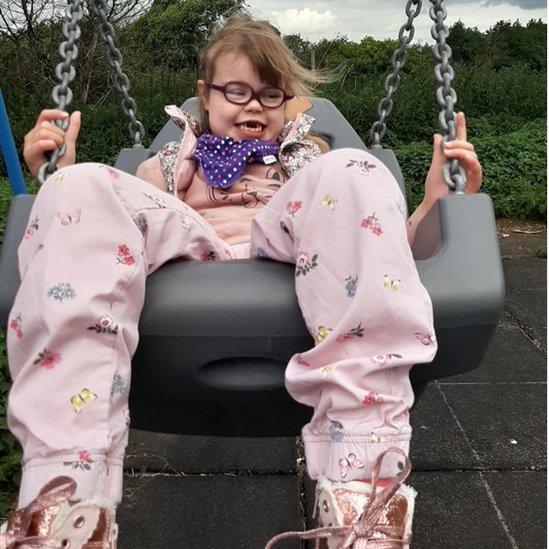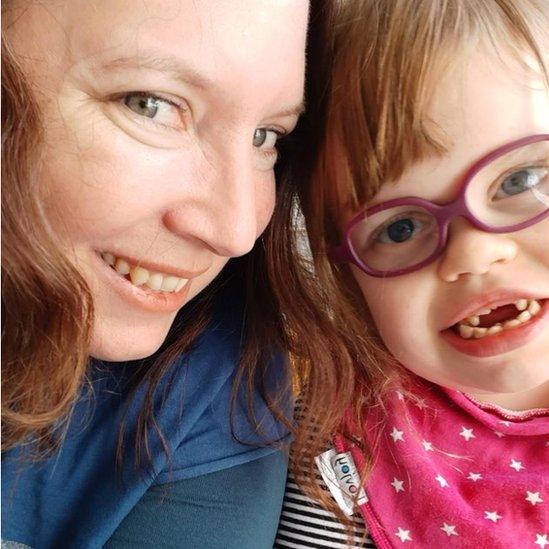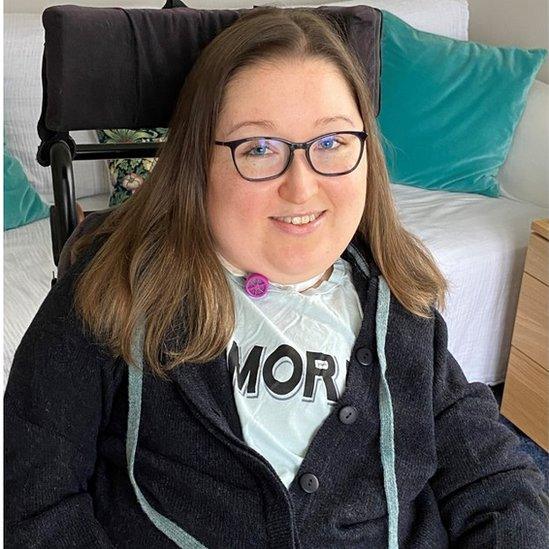Playground overhaul needed so disabled children can join the fun, charity says
- Published

Lucy Bowen, using an accessible swing in a playground near her home in Kent
Disabled children can find themselves excluded from their local playgrounds because of poor design and a lack of consideration of their needs.
But now disability equality charity Scope has started a campaign to help parents fighting for change.
For 12-year-old Lucy Bowen, trips to the playground can leave her disappointed and isolated, says her mum Sam.
Lucy has a rare genetic condition which means she uses a wheelchair, has severe learning disabilities and is non-verbal.
She communicates in different ways, according to her mum - and she loves to play.
Lucy's life has been precarious, marked by blue-light trips to hospital in the middle of the night for a rare form of epilepsy: "She's nearly died several times," says Sam - and then there have been a series of massive procedures, including heart and hip operations.
"It means that the normal stuff like accessing play and going out to the community is all the more important."
Making memories
When Lucy was tiny, her parents would lift her on to play equipment "or hold her on to stuff because things weren't safe".
But now she's bigger, even in a newly-built accessible playground near their home in Faversham in Kent, some equipment "can only be accessed by steps which are completely out of bounds to us".
"My daughter can only sit in her wheelchair and watch the other children run around playing up high on it. Where's the fun in that for her?"

Sam says Lucy might be non-verbal, but finds other ways to communicate
Lucy began to be aware of her differences from other children from the age of about six, and can become upset when she realises she's missing out, says her mum.
"Playgrounds are so much more than swings and roundabouts. They are chances to make memories that will last forever.
"Some disabled children like mine have life-limiting conditions, there's a risk that they won't outlast their childhood."
It means, says Sam, that for her family in particular, "every memory made counts".
Research for Scope suggests almost half of families (49%) feel their local playground is not accessible.
The Opinium polling company questioned 1,000 parents of disabled children aged under 12 in England and Wales.
Of these:
one in seven said they could not enjoy the playground as a family because siblings could not play together
and one in 10 said their disabled child had hurt themselves on equipment not designed for them
It's crucial for playgrounds to be designed with all children in mind, argues Scope.
The charity wants national governments to ring-fence money to improve and refurbish playgrounds, and argues £37m should be allocated in England and £7m in Wales.
Last year, the government's National Disability Strategy highlighted the need, external to make playgrounds more inclusive as a key way of improving disabled people's lives from their earliest years.
For Sam this was a welcome move, but she wants the government to go further.
"It doesn't have any action points," she says of the official document.
Local authorities need better guidance on what "accessible actually is" and they should consult with the families of disabled children about what works best, she argues.
Scope's lead policy adviser for children and young people, Emma Vogelmann, who has herself used a wheelchair from childhood, agrees that non-inclusive playgrounds are having a huge impact on families with disabled children.

Emma Vogelmann is Scope's lead policy adviser for children and young people
"Every child has an equal right to play, yet many disabled children can't enjoy their local playground," says Ms Vogelmann.
Inaccessible equipment "leaves disabled children shut out and missing childhood experiences", she argues.
"What we're calling for is for local authorities to co-produce plans for refurbishing playgrounds with their communities, and really make sure they engage with families with disabled children who are the experts on what they need."
For Emma and Sam, key features to consider include:
wide walkways and ramps
ground-level roundabouts with fixings for wheelchairs
bucket-style swings for children who can't support themselves
avoiding surfaces wheelchairs can sink into, like woodchips or sand
play equipment that makes calming sounds for children with autism
brightly-coloured equipment and tactile floor surfaces for children with visual impairments
better fencing
Responding to the campaign, the Welsh government said local authorities already had a duty under existing guidance "to assess for and secure sufficient play opportunities for all children".
"We are committed to improve opportunities for all children and young people to play and, in particular, to support inclusive play," said an official.
In a statement, the UK government said: "Every child deserves equal access to play equipment. Where a local council is responsible for a playground, they must carefully consider how to make them inclusive and accessible."
Extra money has been allocated to councils this year to be spent on services including playgrounds, the statement continued.
'Swinging together'
Both Sam and Emma agree accessible equipment should be available to all children, so no-one is segregated -and it needn't cost a fortune.
Sam would like to see a bucket swing retrofitted to hang next to the regular swings in every playground, so that children like her daughter can queue up to use it with everyone else.
"Everybody can swing together, it's not rocket science, a very easy, very affordable retrofit that can be done in a day."
"She still enjoys playground activities and we still enjoy being able to be part of normal society, which I think is massively huge.
"I want families like ours to stop feeling hidden."